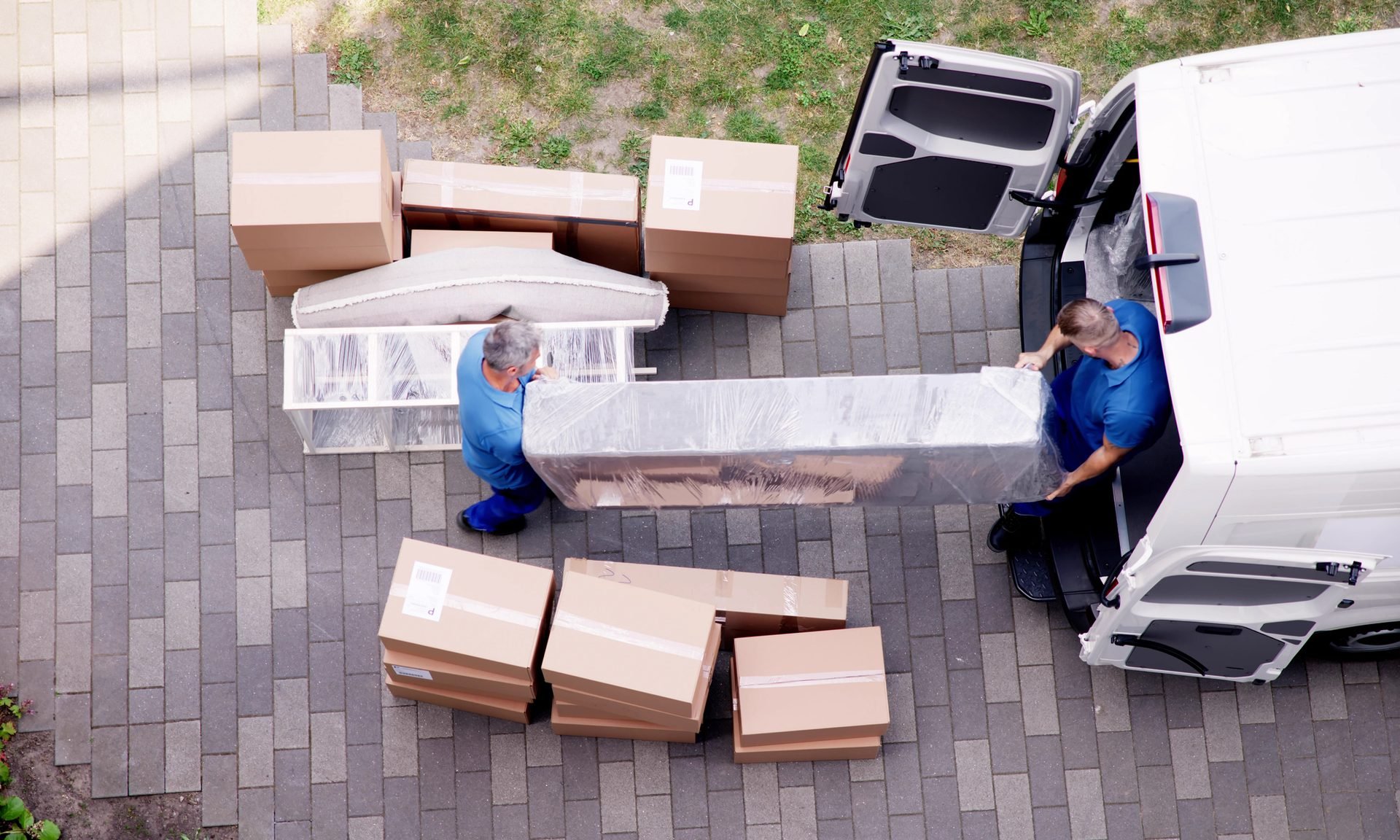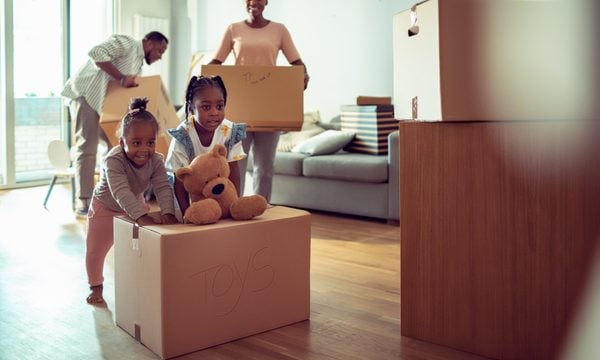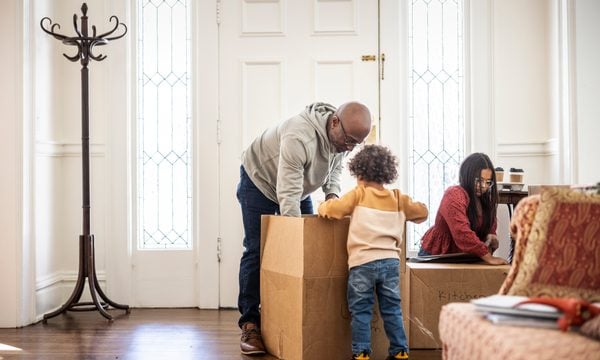A Moving Checklist for 2026
Here are all the things to think about when you're planning a move, including a downloadable checklist for moving.

Some or all of the mortgage lenders featured on our site are advertising partners of NerdWallet, but this does not influence our evaluations, lender star ratings or the order in which lenders are listed on the page. Our opinions are our own. Here is a list of our partners.
You’re getting ready to move, but don’t know where to start. This comprehensive moving list helps you keep track of important things to do before, during and after your next move.
We've also included a downloadable version of our moving checklist.
As soon as you find a new place
☐ Hire the movers. Contact at least three moving companies for quotes. Avoid surprises later by understanding whether the pricing is based on estimated weight or hours. Check out our list of the best full-service movers and read about how to hire movers.
Reputable movers will want to do a virtual or in-person walkthrough of your home and property to provide a reliable quote. To make sure you get an accurate quote, do these things during the walkthrough:
- Communicate any items that won’t be coming on the move.
- Point out antiques, heirlooms, art, pianos and similar items that need special care or special packaging.
- Ask what the movers won’t move (for example, candles, cleaning products and your grill's propane tank are often on the no-go list for movers).
- Flag items of special value that might require additional insurance from the movers. Make sure to declare, in writing, any items valued over $100 per pound.
☐ Take a video of your home contents before you start packing. This will help you determine later if anything is lost or damaged in the move..
☐ Start gathering moving supplies. If the moving company won’t be packing your stuff, get moving boxes, tape, bubble wrap, old newspapers or wrapping paper, and markers. Look for ways to get cheap or free moving boxes to save money on your move.
☐ Find or get appraisals of your antiques and high-value items. An appraisal is your proof of value if the movers lose or damage the item. This can take weeks, but it’s important for proving an item's value if it's lost or broken during the move.
☐ Sort and declutter. Because moving expenses often come down to weight and volume, reducing how much you move can save you money.
Right after you hire the movers
☐ If you rent, give notice to your landlord. Check your lease to confirm, but the rule for giving notice that you won’t renew your lease is typically 30-90 days.
☐ If you rent, tell the landlord what day the movers are coming. Your landlord may require advance notice to use the service elevator, loading dock or certain stairwells. They might also require the movers to provide proof of insurance or other documents ahead of time.
☐ Request time off from work to move. You need at least the day the movers load and the day the movers unload.
☐ Tell the HOA what day the movers are coming. Find out if you need a permit from the city or the homeowners association for movers to park on the street while loading and unloading. This applies to the locations you’re moving from and to.
☐ Organize your records. Get important financial, legal and medical records in one place, including birth certificates, passports and licenses. It’s a good idea to keep these with you rather than load them in the moving truck.
☐ Plan for unmovable items. Figure out what to do about items the movers said they won’t move, whether that’s getting rid of them or arranging alternative shipping. This could include items like a car, boat, house plants or hazardous chemicals.
☐ Set a cut-off or transfer date for utilities and other household services. And follow up by setting up new services for the ones you can’t transfer. Here are some common things to manage when moving:
Tap to show the list
- Electricity.
- Water.
- Sewer.
- Gas.
- Trash and recycling pickup.
- Internet.
- Cable.
- Homeowners association dues.
- Housecleaning services.
- Gardeners or landscapers.
- Food delivery services.
- Subscription boxes (beauty, clothes, food, etc.).
- Snow removers.
- Gym memberships.
- Home security/alarm system monitoring services.
- Babysitters.
- Dog walkers.
- Caregivers.
- Exterminators or pest control.
☐ Check your insurance coverage and buy more if needed. Your homeowner or renter insurance policy may cover your belongings for theft or vandalism when in transit or storage, but it usually doesn’t cover mishaps like an item being dropped and broken. Your moving company should have some liability protection at no cost to cover damage, but it may not be enough. You can purchase more protection from your moving company or insurance provider.
6 weeks before move day
☐ If you rent, schedule a walkthrough of your old place. Get this on the calendar with your landlord now. You will probably need to do this right after moving day to get your deposit back.
☐ Schedule a walkthrough on your new place. Get on your agent or landlord's calendar now. This gives you a chance to note any pre-existing damage or flag any issues before closing the transaction.
☐ Schedule installs for utilities, cable, internet, security systems or other equipment-based services at the new place. To avoid being without services for a while, don’t procrastinate.
☐ Book the painters, electricians or other home services you will need right away when you move in. It’s easier to have this work done while everything is still in boxes or before your stuff arrives.
2 weeks before move day
☐ Call the movers to confirm everything. If they somehow lost your booking, better to find out now while there is still time to rebook them or find another moving company.
☐ Schedule cleaning and repair work on your old place. If you’re renting, your lease should detail how you need to clean to get your deposit back. Schedule cleaners now if you know you won’t have the time or energy after the move. Fill holes and cracks with spackle, and touch-up scuff marks.
☐ Get cash to tip the movers. If you plan on tipping your movers, better to get the cash now before you run out of time handling last-minute details.
☐ Figure out what to do with pets and kids on loading and unloading day. Depending on the age of your kids, either put them to work or send them away for the day.
☐ Ask friends and family for help. If you will handle packing and unpacking yourself and need help, now is the time to get on the schedule of friends and family members.
☐ Drop off or schedule pickups of charitable donations. After decluttering, you’re likely to have items you don’t want to move or sell. For items in good shape, donate to charity. For items to toss, schedule a junk removal company. Some moving companies will handle this for you for an extra fee.
☐ Use up your food stores. Movers usually don’t move perishable items. Start eating everything in the refrigerator, freezer and pantry. If you’re moving the fridge or a standalone freezer, defrost at least 24 hours before moving it.
☐ Photograph complex tech setups. This will help you remember how to reconstruct everything on the other end.
☐ Have your mail forwarded. You can do this on the U.S. Postal Service website. Typically the USPS will forward mail for one year but magazines for only 60 days.
☐ Pack a “go box” of items that stay with you when everything else goes on the moving truck. These are things to get you by between move-out and move-in day.
- Toilet paper.
- Paper towels.
- Cleaning products.
- Set of sheets and towels.
- Some dishes and utensils.
- Chargers.
- Flashlights.
- Water.
- Scissors, screwdrivers and a hammer.
- Garbage bags.
- Pet food, leashes, toys, beds and medicines.
- Passports.
- Credit/debit cards, and your checkbook if you have one.
- Important papers.
☐ Start a box of essential and irreplaceable items for each person in your household. Include items such as medication, a change of clothes, special jewelry, mementos, important documents, computers, etc. This box will stay with you and won't go with the movers.
Advertisement
The day before moving day
☐ Get the payment for the movers ready. Accepted forms of payment for movers vary, so make sure you have what you need. Depending on the company, it could be a personal check, cashier’s check, credit card or cash. Note: If a mover accepts only cash, that could indicate a moving scam.
☐ Transfer your prescriptions to a new pharmacy. Make sure the auto-refill is turned off at your old pharmacy and turned on at the new one if you’re moving out of the area.
☐ Drain the gas out, and safely store or dispose, of lawn mowers or other equipment you’re bringing.
☐ Empty the appliances. Empty the dishwasher, washing machine, dryer and fridge.
☐ Retrieve keys for your old place. Gather any keys you’ve hidden on your property or given to neighbors.
☐ Charge your phones. Don’t forget to plug in phones and keep your charger handy.
On moving day
☐ Get the bill of lading (BOL). This is the legally binding contract between you and the mover that outlines terms of the move. On moving day, before anything is transported, you should receive a partially completed copy of the BOL to review and sign. After your move is done, you will sign the BOL again to confirm everything was completed as expected..
☐ Review the inventory list. Once everything is loaded, ensure you receive and review an inventory list that notes the condition of each item. If anything is missing or inaccurate, dispute it now and before signing anything. If you have high-value items (valued over $100 per pound), make sure they’re declared on a separate high-value inventory form.
☐ Direct the moving action. Be present. Supervise. Communicate. Answer questions and stay until the job is done.
☐ Do a final walkthrough. Once the crew tells you the truck is loaded, walk through the house one more time. Look in every closet, cabinet and drawer for forgotten items. Check inside appliances that are staying — the washing machine, dryer, dishwasher, refrigerator and oven. Look on high shelves and in the mailbox. Walk around the front, back and side yards of your home. Also, check for damage the movers caused and photograph it.
☐ Change/delete codes on the alarm system if it’s staying with your old place.
☐ Reduce electricity use. If the electricity isn’t disconnected yet, turn off all lights and adjust the heat or air so it doesn’t run all day. Take meter readings or photos for records.
☐ Lock up and return keys. Close and lock all windows and doors, and leave keys as agreed. If you’re renting, return old keys (including mail, gym, storage, extra garage) and pick up keys to your new place.
☐ Give the movers the destination address again and how to contact you. Ask if they need directions and provide them, if needed. Give them your cell phone number, and get their contact information if they’ll give it to you.
Upon reaching your destination
☐ Check utilities. If services should be connected and aren’t, call the appropriate provider.
☐ Direct and supervise movers. Ensure boxes and furniture are placed where requested. Unpack essentials first.
☐ Review and sign the final paperwork. This should include the bill of lading as a receipt and agreement of a job completed. You will also receive the final inventory list of what was transported. Before signing off on either document, make sure everything is accurate and done as you expected. Note any items that are missing or damaged. (Watching the original video of your belongings can help with this.)
☐ Tip the movers. This crew may differ from the one that loaded in your old location, especially if you’ve moved far. But if it’s the same crew that you’ve already tipped, you don’t need to tip them again.
☐ Change the locks. You don’t know who else has the keys. Make copies of your new house keys for your babysitter, dog walker or other trusted visitors.
After you’re unpacked
☐ Change your address with everyone you know or do business with.
- Money-related: Work, bank, investment accounts, HSA or FSA accounts, car insurance, life insurance, renters insurance, pet insurance, other insurance policies, credit card issuers, your accountant, your investment advisor, the Social Security Administration, the Veterans Administration and Medicare.
- Kids-related: School, tutors, lesson providers, babysitters, daycare, sports teams and coaches.
- Medical-related: health insurance, dental insurance, vision insurance, kids doctors, parent doctors, dentists, therapists, cord-blood storage, prescription deliveries and the veterinarian.
- Legal-related: Your lawyer, voter registration, state and local tax authorities if you are self-employed and the city/county property tax assessor.
- Life-related: Amazon, delivery apps, ride apps, family location-tracking apps, newspapers, magazines, streaming services or cable, your internet provider, the neighbors, your alma maters and alumni organizations, charities, the pet microchip company, airline frequent flier accounts and hotel rewards accounts.
- Family-related: If you send out holiday cards, announce your move on them.
☐ Claim your property tax exemptions. Some counties provide homestead exemptions that can significantly reduce your property tax bill — but you have to file the paperwork to claim them. If you purchased a house, you’ll likely want to file for a property-tax exemption once you get settled.
☐ If you rent, check on the ETA of your security deposit. The deadline should be in your lease, but sometimes landlords need reminding.
Advertisement
If you’re planning a long-distance move
Right after you hire the movers
☐ Find a temporary place to live. There may be a gap between when you move out and when you move in.
☐ Book flights, hotels and/or rental cars for the trip to the new place. Arrange for transportation from the airport if you’re flying. If driving, plan your route and any activities along the way.
6 weeks before move day
☐ Get your vehicle serviced. Make sure it’s up for the long drive if you’re not having it shipped.
☐ Arrange vehicle shipping. If you won’t be driving your car and your moving company can’t transport it, you may need to schedule with an auto transport company.
2 weeks before move day
☐ Clean out your safe-deposit box. And close the account so you don’t keep paying for it.
☐ Return borrowed items, like library books. Look for items that you’ve borrowed from friends and family as well.
☐ Pick up your dry cleaning. Be sure to cancel the account if you pay for pickup or delivery options.
☐ Cancel your gym membership. Fill out and submit your paperwork, and clean out your gym locker.
☐ Consider changing your bank. If you can’t keep your current bank or credit union, go ahead and research a new one and set up an account if you can.
On moving day
☐ Tip the movers. If the crew packing your truck differs from the one unloading at your new place, consider tipping them as well.
After you’ve unpacked
☐ Get a new driver’s license. In some states, this must be done within 30 days..
☐ Register your car. Check your state’s DMV website to see how long you have to register and whether you will need an emissions test.
☐ Establish pets with a vet. By already having them established, you’ll likely be able to get an appointment more quickly when they need care.
☐ Get a new pet license from the city (if required). This can help local shelters reunite you if your pet gets lost. Also update microchip information.
☐ Get a new alarm license from the city (if needed). This is often required in order to receive a response from law enforcement if your home security alarm goes off; it can also help avoid false-alarm fines from the city.
☐ Get a new safe deposit box. Not all financial institution locations have safe deposit boxes, but most list the locations that do on their websites.
☐ Update your estate planning documents. Different states have different rules about how wills, health directives, trusts, powers of attorney and other estate planning documents have to be worded and filed. You may need to get an estate attorney to redo some of your documents so they're valid in your new home state.
If you have kids
Right after you hire the movers
☐ Notify your current school. Your current teacher may be able to help your kids with the upcoming transition.
☐ Register for the new school. Don’t assume your kids can go to any school in the district, or even the one closest to your new home. Different districts have different rules. Get information about start and end times and bus transportation if needed. Ask what paperwork — such as transcripts or medical records — you’ll need to provide.
☐ Register the kids for daycare or after-school activities. If you’ll need somewhere for the kids to go, or a new sports team, get a headstart on registering them before you move.
6 weeks before move day
☐ Request the transfer of records. By now, you know what school and medical records are needed, so make an official transfer request.
☐ Figure out what you need to baby-proof the new place. Order any new items now to pack in your suitcase that you take with you. This way you can baby-proof your new place as soon as you move.
☐ Schedule goodbyes and last play dates. Give your kids a chance to say goodbye to family, friends, neighbors and caregivers.
☐ Identify which toys or comforting items the kids need for the move. These might be things to help them handle the chaos and anxiety or items to entertain them if there’s long-distance travel.
☐ Enroll kids in tutoring.If your kids are currently tutored to support their learning, research and set up new tutoring to avoid gaps when they start their new school.
Moving to a new state when a family member identifies as transgender or non-binary
Updating your driver's license
☐ Research what documentation you need to update your driver’s license. States differ in what they require to replace a valid out-of-state driver’s license. For example, Texas requires you to provide an original or certified copy of your birth certificate or an unexpired passport; however, the state says a passport is not guaranteed to work on its own. If the gender marker on one of these doesn’t match the other, or the gender marker you are requesting on your driver’s license, it’s likely to cause issues.
☐ If you have a non-binary gender marker on your current license (“X”), research if your new state allows the same marker. Not all states allow the non-binary “X” marker on state documentation, such as driver's licenses. So if you have an “X” gender marker on your current state’s IDs, moving to a state that doesn’t allow your gender marker will mean you have to change this information on your IDs in your new state.
Changing your name
☐ Check if your new state requires you to publish your name change if you plan on doing so after you move. Some states require that individuals publish their name change request in circulars such as local newspapers. If you plan to change your name soon, check if your new state has this requirement. If so, you might have to pay to publish the announcement. Because the information will be publicly available, this could create an issue if you aren’t planning to be open about your transition. If that’s the case, consider changing your name before moving if your current state doesn’t require you to publish a name change announcement.
Receiving gender-affirming care
☐ If your insurance is going to change, verify with your new employer that there are no coverage exclusions that will affect you or your family. Some states exclude gender-affirming benefits in their medical insurance plans for state employees or through programs that pay for healthcare with public funds.
☐ Verify if the new state allows gender-affirming care for minors if you have a child that needs it. Some states have passed bills that prohibit medical professionals from providing gender-affirming care or gender transition procedures to patients under 18 years of age, even with parental consent.
Enrolling your transgender or non-binary kids in school
Check if your child will be affected by state laws that:
☐ Require kids to play on sports teams as the sex they were assigned at birth. West Virginia, for example, has passed laws that prohibit minors from playing on sports teams that don’t align with the sex they were assigned at birth in schools and institutions that receive state funding.
☐ Require kids to use restrooms that are designated for the sex they were assigned at birth. Some states have laws that require kids to use school restrooms that are designated for the sex they were assigned at birth.
☐ Prohibit educators from supporting social transitioning in schools. For example, Texas prohibits school employees from providing students under the age of 18 with information or guidance about socially transitioning. Some policies vary by school district, such as a Texas school district’s policy that doesn’t require teachers to use a student’s preferred pronouns, so you’ll want to research specific districts before committing to one.
Article sources
NerdWallet writers are subject matter authorities who use primary,
trustworthy sources to inform their work, including peer-reviewed
studies, government websites, academic research and interviews with
industry experts. All content is fact-checked for accuracy, timeliness
and relevance. You can learn more about NerdWallet's high
standards for journalism by reading our
editorial guidelines.
On this page
- As soon as you find a new place
- Right after you hire the movers
- 6 weeks before move day
- The day before moving day
- On moving day
- Upon reaching your destination
- After you’re unpacked
- If you’re planning a long-distance move
- If you have kids
- Moving to a new state when a family member identifies as transgender or non-binary
More like this
Related articles
AD
Stress-Free Moving with Safeway
Call a moving coordinator at Safeway Moving Systems Inc.
Mon–Thu 9a–8p, Fri 9a–7p, Sat 10a–7p, Sun 10a–4p
Lock In 10% Off Today
on moveBuddha's website

AD

Stress-Free Moving with Safeway
- Transparent flat-rate pricing with no hidden fees;
- GPS-tracked trucks and barcoded inventory system for peace of mind;
- Special Offer: Mention "10%" for a limited-time NerdWallet discount.
Call a moving coordinator at Safeway Moving Systems Inc.
Mon–Thu 9a–8p, Fri 9a–7p, Sat 10a–7p, Sun 10a–4p

Lock In 10% Off Today
on moveBuddha's website














